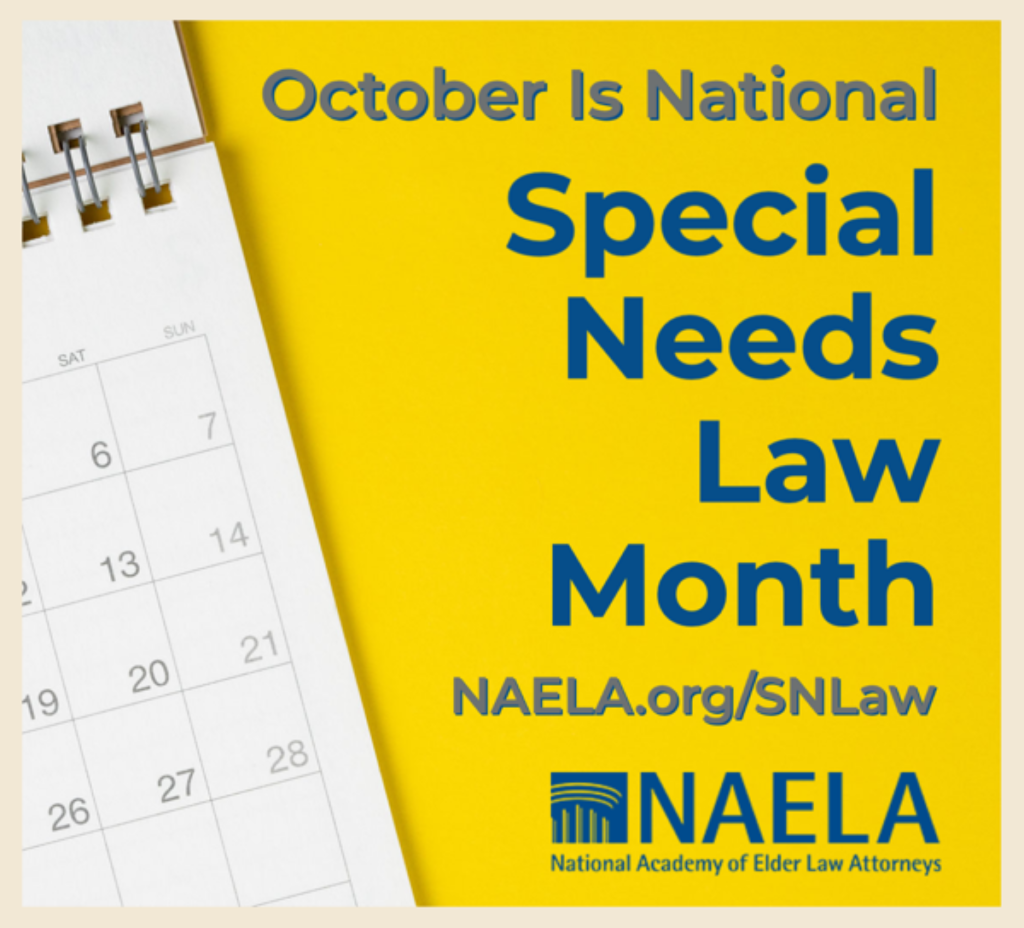The National Academy of Elder Law Attorneys (NAELA) established October as National Special Needs Law Month. It coinsides with World Down Syndrome Awareness Month.
Elder Law & Special Needs Law
The legal planning needs of adults with Down syndrome, Autism, Cerebral Palsey or other special needs can be similar to the legal planning needs of adults with cognitive impairment due to dementia, or physical impairments due to stroke or other conditions. For this reason, knowledge of and experience with Special Needs Law is part of the criteria for becoming a Certified Elder Law Attorney. NAELA is a professional association dedicated to improving the quality of legal services provided to older adults and people with disabilities.
What are Special Needs?
“Special Needs” is a broad term referring to someone with one or more areas of difficulty (physical, emotional, behavioral, cognitive) that causes the individual to require addition or specialized services or accommodations at school, work, or in the community. (https://www.parents.com/why-you-should-not-say-special-needs-8619300)
What is Down Syndrome?
Down syndrome (or Trisomy 21) is a naturally occurring chromosomal arrangement that has always been a part of the human condition, and is universally present across racial, gender or socioeconomic lines. Down syndrome is the most common chromosomal condition, and the most common chromosomal cause of intellectual disability in the US. Someone with Down syndrome is born once in approximately 775 live births in the US, although there is considerable variation worldwide. Down syndrome often results in varying degrees of intellectual and physical delays, but with early intervention, educational inclusion, and supportive services such as speech therapy and occupational therapy, people with Down syndrome are living longer, more meaningful lives.
Special Needs Planning
One way that families can celebrate the life of their loved one with Down syndrome or other Special Needs is to ensure that they have an adequately funded supplemental needs trust. These trusts are needed to ensure that the individual with Down syndrome can qualify for programs like Medicaid, and will protect and provide for the individual as they age.
Someone with an intellectual disability may need someone to act as Guardian of the Person or Guardian of the Estate. A Certified Elder Law Attorney can help with this process, including arranging less-restrictive alternatives to Guardianship.
Resources & Support
Connect to Care is the Aging & Disability Resource Center serving Dallas County. Funded by Texas Health & Human Services, and managed by Metrocare Services, Connect to Care works collaboratively with partner organizations to coordinate information and referral services.
The National Down Syndrome Society is a non-profit organization founded in 1979 to increase general public awareness and acceptance of people with Down syndrome. Their ission is to empower individuals with Down syndrome and their families by driving policy changes, providing resources, engaging with local communities, and shifting public perceptions.
Locally, the Down Syndrome Guild of Dallas provides accurate and current information, resources, and support for people with Down syndrome, their families, and the community from diagnosis through adulthood. The guild provides education programs, social activities, and resources for Self-advocates (adults with Down syndrome), children of all ages, families, educators, and medical providers.
The Down Syndrome Guild of Dallas also organizes an annual Buddy Walk to raise funds and awareness. This year the Dallas Buddy Walk will be held on Sunday, October 20th from 11am – 3pm at Toyota FC Dallas Stadium.
To find a Certified Elder Law Attorney with experience in Special Needs Law near you, go to NAELA’s Find a Lawyer search tool at: https://www.naela.org/FindALawyer.
We at McNair Dallas Law are grateful for our clients with special needs, and for their families who trust us with their legal needs. Contact our office today to ensure you have the right legal planning for a loved one with Special Needs.




